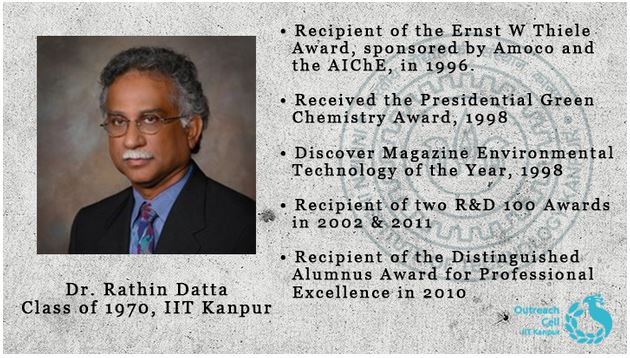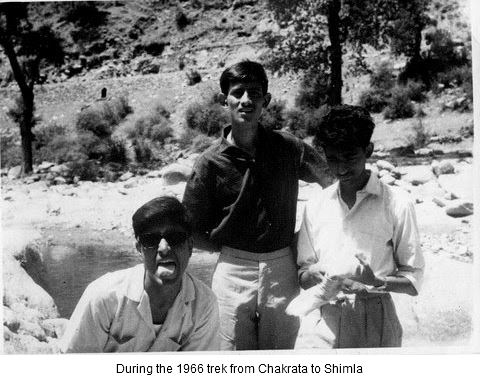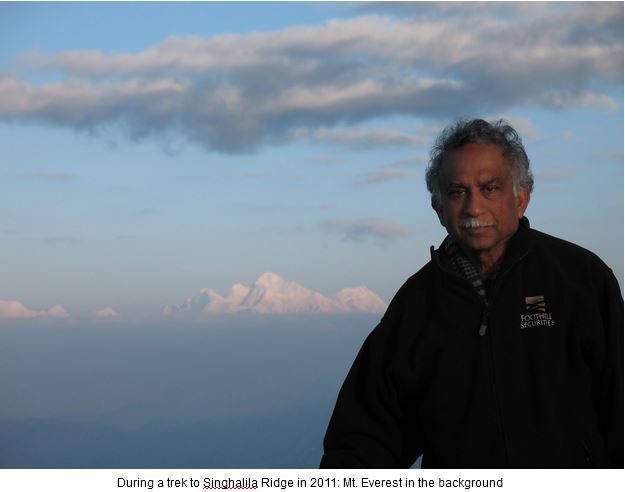Outreach Cell, IIT Kanpur brings you the 3rd edition of the Distinguished Alumni interview Series. We interview alumni who have contributed exceptionally to society after graduating from IIT Kanpur and bring their inspiring life stories to you.

This edition brings you the journey of Dr. Rathin Datta, Co-founder & Chairman at Vertec Biosolvents, Inc. You can check out Dr. Rathin’s LinkedIn profile here:
https://www.linkedin.com/in/rathin-datta-45b615b8/Dr. Rathin Datta is a renowned chemical engineer with more than 40 years of experience in developing and commercializing process and product technologies for both established and emerging companies. His career has been devoted to renewable resources for energy and chemicals – development of innovative technologies, creating organizations and companies in this field and leading them to commercialization. He has over 40 publications and more than 50 U.S. patents in the areas of bio-products, bioprocess technologies, fermentation, separation, enzyme catalysis, energy conversion, and process economics. Dr. Rathin Datta holds a Bachelor of Technology in Chemical Engineering and is also a recipient of the Director’s Medal from IIT Kanpur. He received his PhD in Chemical Engineering from Princeton University.
Throughout his illustrious professional career, he has won many awards, most notable being:
1. Ernst W. Thiele Award, sponsored by Amoco and the AIChE, in 1996
This prestigious award is given to a chemical engineer in the US mid-west for significant innovations and contributions to the advancement of the field. Dr. Rathin was recognized for original research in metabolic engineering and membrane technologies.
2. Presidential Green Chemistry, 1998
This major award is given once a year by a special organization of the US EPA for major innovations, which lead to environmentally important products and technologies. (The award is signed by the Vice President of the U.S. – Dr. Rathin is proud to say it was Al Gore).
3. Discover Magazine Environmental Technology of the Year, 1998
This “Oscar” style award is given by the Discover magazine once a year for technology innovations in specific fields.
4. R&D 100 Award, 2002
Every year 100 significant technology achievements are selected by this organization. Dr. Rathin received this award for development of an electrodeionization technology with Argonne National Laboratory.
5. The Distinguished Alumnus Award – IIT Kanpur, 2010.
Every year The Indian Institute of Technology, Kanpur, confers its DAA award to a few of its alumnus for outstanding achievements.
6. R&D 100 Award, 2011
This award to the Argonne National Laboratory was for an enhanced renewable methane production system, Dr. Rathin’s second R&D 100 award.
Here are some excerpts from our conversation with Dr. Datta:
1. How was your experience here at IITK? What are the fondest memories that you have from your time here?
These are some of our most formative years and really memorable ones. It was a very important part of my life. I've had many friends who stayed in touch, some friends in the United States, as well as in India.
We had some wonderful professors that instilled their knowledge and wisdom in us. They also helped us, at least, me to think outside the box, which was very important. A lot of students do rote learning, but our professors at that time went beyond what was in the book. My personal interest and my lifelong career in bio sciences, biotechnology, environment, began at IITK, when I did some research and work on algae growth, making single cell protein as part of my training and my early work. Also very important, my love for trekking started in IITK when we had the origination of the trekking club. I don't know if you guys know that now, but the trekking club at IITK began in 1966 and I was one of the original members. We did some wonderful treks in ‘66, from Chakrata to Shimla and then we did another trek in ‘67, which was to go over the Rohtang Pass from Manali to Keylong, and that was absolutely magnificent. In those days there were no roads, we had to go on tracks, climb about 5,000 feet, come down. Two of the main rivers in Punjab, Beas and Chenab, we crossed them on rickety foot bridges. We were just a group of students with a lot of determination, had no mountain gear and very little money.
I have seen and trekked in many parts of the Himalayas since then. A memorable trek on the Singhalila ridge where you can simultaneously see four of the five highest peaks of the world - Everest, Kanchenjungha, Makalu and Lhotse!
So those were the memorable days. I had a wonderful start in life going to IIT Kanpur.

2. You have worked in the field of biosciences for your whole career. What sparked your interest in this field?
The fields of biotechnology, biosciences, environment require understanding and synthesis of any diverse subjects and knowledge. I've always enjoyed that - not just one line of study, but where variety of knowledge and ideas are needed to solve problems or overcome barriers, and my ability to put things together in different fields has made it very satisfying.
3. So since most of your work has been on renewable energy, could you tell us more about why ethanol is one of the most sought after renewable alternatives to fossil fuels?
One of the most famous theoretical physicians, Freeman Dyson, was critical of the Ph.D. system in academia. What are your views regarding the Ph.D. system? Because at times, it becomes extremely prolonged, and pursuing it requires a lot of patience. What are your suggestions for future generations regarding this?
Based on fundamentals of thermodynamics and efficiency, ethanol is the primary molecule to make from renewable resources. There are no ifs and buts about that. It also happens that ethanol is one of the key molecules that can support all of the fuel cycle engine.
For the “Otto” cycle spark ignition engines, ethanol has been used for over a hundred years in different concentrations, so it is compatible and also economically viable because of the high octane number, which is extremely important because that enables engine efficiency increase. So we can get energy saving as well as use renewable fuel at the same time, by going towards ethanol.
For the “Diesel” cycle compression ignition engine, you can extend the chain length of ethanol and get fuel compatible with diesel.
For the jet engines aviation fuel by extending the chain of ethanol is feasible and it’s already being done by some companies.
It is very important to note that the infrastructure for these engines and fuels are worldwide.
Last but not the least is that ethanol is the key intermediate for the chemical industry because it can be dehydrated to make ethylene and many other molecules. It is useful to remember that India had for many years, an ethanol-based chemical industry. I remember going by train to my home, Dehradun, we’d go by Bareilly and there was a huge chemical plant, that was based on ethanol and other chemicals. So it’s really doable, and there's no question that if we’re going towards renewable chemicals and fuels, ethanol is going to be the key molecule.
4. What are the most fundamental challenges in completely replacing fossil fuels with renewables?
The challenges we face are many.
The current fossil fuels and petroleum based industry, which is humongous in the world is very well entrenched, and to make them think outside the box,invest and go in this direction would require major changes in strategy, management and technology.
It is going to be very important to have worldwide incentives and directives provided by all the nations, combined, and not just having the Paris accord but actually going towards the implementation of specific technologies worldwide. That is going to require both political changes, and also making people understand through journalists and other experts, how to go in that direction.
Overcoming climate change is going to be fundamental for our survival.
Professionally, I have devoted my career to develop and implement renewable energy and chemicals with modest success and rcognition. Climate Change” is the existential crisis looming over us. Much has been written and publicized about it, mainly in fearful and apocalyptic terms. There are several technologies that have become economical and implementable within a very reasonable timeframe.
To name a few:
So those are my thoughts sitting here after spending about 40 years: We need to have an open and inclusive political system and bureaucracy with long term policies. We need media and experts to go and say, these are the things to do and show the world that good things can happen with jobs and positive economic impact, and not go there claiming that oh, the sky is falling, the sky is falling. There are many positive messages that can be put together forward and support the fact that renewable energy and chemicals are not going to be destructive to the economy. As a matter of fact it is going to bolster the economy, create jobs. So while we bring in new technologies, it will build factories, use materials and equipment and at the same time take our carbon footprint from non-renewable to renewable, as well as provide technologies and opportunities to also sequester carbon, which is absolutely necessary.
5. What are the challenges that you've personally faced in commercializing renewable energy technologies?
I have been one of the pioneers in this field, and most of the challenges we faced, at Coskata for instance, which I co-founded and was the Chief Scientific Officer, were not technical or about making the economics work. We successfully demonstrated the technology, scaled up and the economic potential, but the biggest challenge has always been to get through the first commercial stage, and also have a strong management team that could take it to that level. So that has been the biggest challenge, and many of the early stage technologies face the same kind of challenge. These are big ideas, things and with the energy field being very large it has to be done uniformly worldwide. But good things are happening - look at India, we have an ethanol plant now that is made from petroleum off gases in the refinery in Panipat, so India is already taken a step there, and other good things are going on in other places. However, we need a concerted focused effort, with the support of all the political, economic and environmental pushes.
6. As you said that surely good things are happening all over the world. Do you think that given the rate of development that we are currently seeing, the current efforts that we make would suffice in combating the rising climate issues?
That's a very good question. I see about a dozen technologies and advances that have happened that are going to really help us overcome some of the global warming and other challenges.
In the last 10 years. Solar photovoltaics have become economical and pretty popular. People are doing it all over to get dispersed energy generation and usage. In nuclear power, we have to cut down the costs, particularly the capital costs, and Europe has been doing that for decades without sacrificing safety. So copying those kinds of uniform and repeatable designs should be implemented worldwide. Look at wind power, it’s already providing actual power to electricity grids, all over the world,especially in Europe and in America.
We talked about biofuels. Ethanol is the primary biofuel and can be implemented economically. The other one which is very important is biochar from agriculture and forestry residues. Biochar is partially carbonized from the residues of these materials. What it can do is to not only sequester carbon, which is absolutely important, but also improve agricultural yield and productivity. Biochar from bagasse could very important for India.
So these are the kind of technologies and advances that I see, which are implementable within a reasonable time frame, and be economical. And they can really do a great job about our carbon footprint, as well as sequester carbon, which is absolutely required to reduce the amount of carbon dioxide in the atmosphere.
What I see with my contacts and other experts is that these advances should be put together in a positive image, with both political and other kinds of support so that they can be done. Remember, these require decades of patiently moving forward. You require the political leadership, you require the bureaucracy that is very honest, and then you also require the media to say positive things about it, other than “Oh man, bad things are going to happen in climate change, what are we going to do?”
There are actual real things we can do and these should be put in a very positive light.
7. What measures do you think could be taken so that renewables are viewed in a positive light? How do we make people aware that these changes are not something to be negatively looked at?
Firstly, worldwide, we should be investing in political leadership that will treat things in a responsible manner. In my opinion, the political leadership that is inclusive and non-authoritarian is going to be very important because they can bring people together to support the policies and directives. Also an honest bureaucracy going for the good things together and move forward.
The other piece is to help change the media coverage, the journalistic coverage about climate change from “it is going to be horrible” to “we can do many positive things to overcome it”. It should give a good, positive image of the technologies and advances that are emerging so that the population can understand and become supportive.
The entrenched fossil fuel organizations will need to change their direction and strategy because the current strategy is not going to work. This will require incentives as well as directives. Management, technologists, shareholders all need to move in new directions not just the “Whitewash” they do because if they don’t they will go out of existence.
8. What do you think the current pandemic has done positively towards combating climate change or has it changed the environment towards the worser side?
That is a very hard call because this current pandemic thing is a transient, and as far as I'm concerned, in my own opinion, it has been blown out of proportion. We have seen such pandemics in the recent past. Look at the H1N1 pandemic that happened in 2009, these large claims of infections ( >60 million) and estimated deaths (200,000 to 500,000) ! But the world did not go through such a shutdown and economic destruction. And in my opinion, the COVID19 is going to be lesser than the H1N1 pandemic. So we cannot shut down the world, we have to be able to overcome without such worldwide disruption.
In my judgement related to the climate change, we may have some positive outcomes. This worldwide experience may give people a pause to say that look, we're going to face some very existential issues with climate change and at this point, all of a sudden to do something universally, maybe we should start looking at putting these policies and these incentives and technologies in a more universal manner and moving these positive things forward.
9. What are the main differences between the research that is done in industries and the research that is done at universities? And if one has tried to incline themselves towards either one. So how, what is your opinion on that?
They are actually substantially different. Let me start with industrial research, and this has been something I've done all my life. Industrial research has clear performance and economic targets that are set up right in the very beginning. It has many constraints - time, existing regulations, funds and priority. It requires problem solving often involves multidisciplinary teams.
Academic research, on the other hand, is often about expanding the knowledge in a certain specific area, which is usually the investigators’ field of expertise. So that is the major rationale for academic research, you expand the knowledge in a very often in a small, specific field of interest.
You asked which should one choose, there is not a clear answer. It happens due to one’s own targets, mindset and ability. In my case, after finishing my PhD in Princeton, I had considered going to the academic field, but I got a very good job at a major pharmaceutical company, Merck, and I started to work there. I worked with some fantastic, competent, very good individuals, who taught me a lot, and I learnt how industrial research is done from some of the best organizations and some of the best people and I have never looked back.

10. What advice would you give to students at IITK right now, in general, towards academics and towards having a great career?
That's again a difficult question because there's no clear answer. I think the best thing I can advise anybody to do is whatever you do should be really clear and very concise. You should be looking at what your abilities are, or what your interests are, focus on what you can do well. Taking courses and doing well is a critical part of your education. But also highlight your interests and your outside activities as well. That’s very important.







